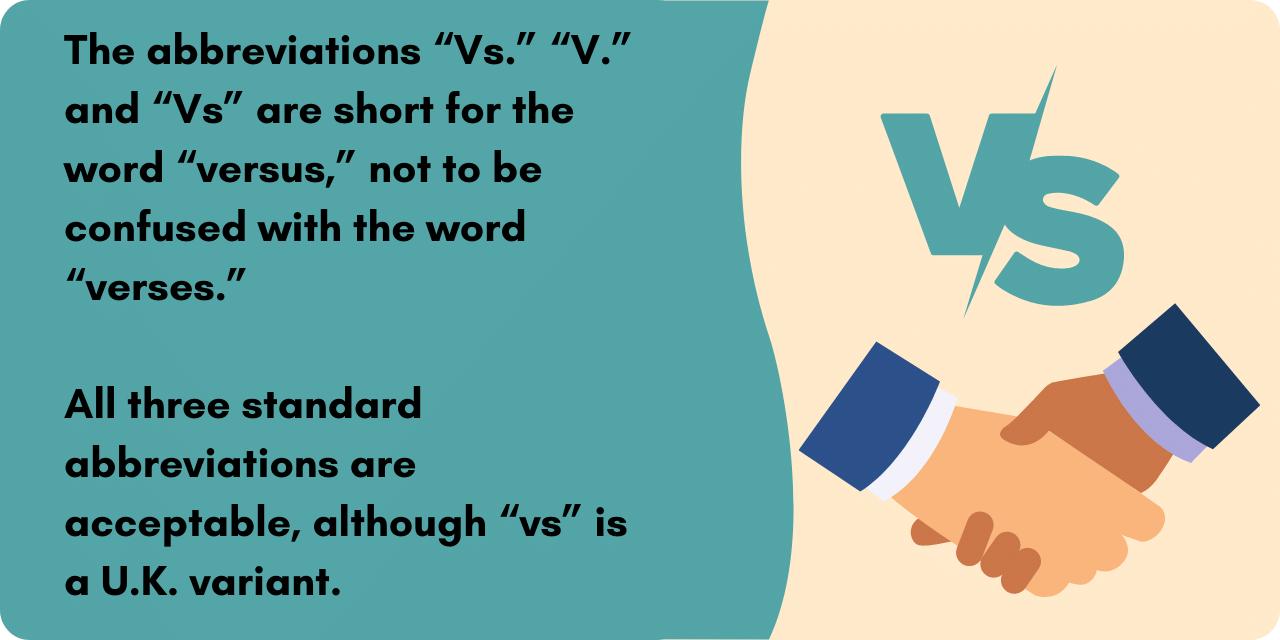“Vs” Versus “vs.” Versus “V.”
- The abbreviations “Vs.” “V.” and “Vs” are short for the word “versus,” not to be confused with the word “verses.”
- The word versus means “opposed” to something or someone, as in competition.
- All three standard abbreviations are acceptable, although “vs” is a U.K. variant.
When a word appears with several different abbreviations, the discerning eye wonders why that is the case and whether someone might be misusing this shortcut. The term “versus” falls into this category, as it has three common abbreviation variations: “vs” and “vs.” and “v.”
While a reader might briefly muse over this difference in appearance and move on, anyone who spends a considerable amount of time writing and values proper grammar will want to know more to ensure their writing is tip-top.
The truth is that each of these abbreviations can be correct. The question now lies in when to use each.

What Does “versus” Mean?
Not to be confused with “verses” (which refers to paragraph-like divisions within songs or poetry primarily), “versus” pits one person, place, or thing against another, in opposition.
- Tonight’s baseball game is Red Sox versus Yankees, so I will be watching it!
Since these two teams are in opposition, competing for a victory, the word “versus” is appropriate. Perhaps the most common appearance of the term relates to sports games, as there is generally one person or team playing against another in competition.
However, that is not always the case:
- Hannah sat watching her favorite form of entertainment: Dad versus the lawnmower.
Rather than competing with another person, Dad is struggling with his lawnmower. A little tongue in cheek, the expression in this situation is not a competition as the lawnmower is an inanimate object, but indicates that Hannah’s father is battling with the machine, nonetheless.
- The Eiffel Tower versus the Tower of Pisa: which is the better architecture of the two?
In this situation, someone is making comparisons between the two locations to make a subjective decision as to which is better based on unknown criteria. In this case, it is a competition by contrast.
Nonetheless, in each of those situations, the abbreviation is so common that it felt unusual even to type the word “versus,” so let’s look at those three abbreviations and figure out when to use them.
Using “Vs.” as an Abbreviation
If unsure which abbreviation to use, this is a great go-to option.
It is the most common abbreviation used in the United States, and the pronunciation is that of the word itself: “versus.” Occasionally, when viewing this abbreviation, someone may pronounce it like the word “verse,” but this is improper, especially since that particular word has a different meaning.
As a direct stand-in for the base word, it can function as a substitute for all three of the previous examples:
- Tonight’s baseball game is Red Sox vs. Yankees, so I will be watching it!
- Hannah sat watching her favorite form of entertainment: Dad vs. the lawnmower.
- The Eiffel Tower vs. the Tower of Pisa: which is the better architecture of the two?
Using “V.” as an Abbreviation
If “vs.” works as an efficient stand-in for “versus,” why is there another abbreviation?
While “v.” may appear as an alternate abbreviation in the same context as “vs.” from time to time (and get away with it), the shortcut is for particular situations: legal documents and court cases.
While hundreds of years ago, they used the word “versus” to depict the competition that comes through a legal battle; eventually, the legal world replaced the word with “v.”
It is interesting to note that this pronunciation is like the letter “vee” rather than the word “versus.”
Here are some examples of “v.” in its full glory:
- Brown v. the Board of Education
- Roe v. Wade
- Dred Scott v. Sandford
Using “Vs” or “V”
While the uses are the same, the British have less infatuation with punctuation than the U.S. Rather than sprinkling periods all over. They are content to use the abbreviations by themselves:
- Carl Froch vs George Groves II was a spectacular boxing grudge match with over 80,000 people in attendance.
- Donahue v Stephenson
- While Tabitha was colouring upstairs, she could hear the shouts from mum vs dad in the downstairs living room.
While acceptable in the United Kingdom, ignoring the period as part of these two abbreviations is frowned upon in the United States.
Related: Proper Abbreviation of “Quarter” in Business Communication






